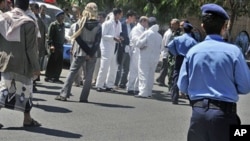A new report says Western security measures in Yemen and Somalia are fueling militancy because local populations see it as a form of aggression.
Yemen expert Ginny Hill co-authored the report that was published by the London-based research group Chatham House.
"The U.S. administration has been providing training and military equipment to the Yemeni armed forces for several years now," said Hill. "And there has been an increase in that cooperation and that relation over the course of the last year. There have been a number of strikes where the U.S. is alleged to have been involved. The key thing to note is that al-Qaida's leadership remains intact despite the increase in resources and the increase in activity."
Yemen became a focus of Western security concerns after a Yemen based group linked to al-Qaida claimed responsibility for a failed attempt to blow up a U.S.-bound flight last December.
Earlier this month, militants in Yemen's capital attacked an armed British embassy car that was carrying a senior British diplomat.
Hill says there is a danger that Western-backed security measures could contribute to tension inside Yemen.
"It is driving a wedge between the president and the tribes and in a country where there is an enormous amount of hostility towards American foreign policy in the region, it is contributing to perceptions that the government of Yemen does not legitimately represent its population," Hill said.
She says rather than a military focus, the drive should be towards bringing economic and political stability to the country.
Co-author Sally Healy, also from Chatham House, says the report wanted to highlight the acute differences between Somalia and Yemen. She says it is dangerous for security experts to lump them together.
Western policies in both countries, she says, should look at the real issues in each country.
"It should be imbedded in political settlements that make sense locally, and just giving security assistance to an ally or a friend in the region does not stabilize the situation if there are a lot of outstanding political problems yet to be resolved," Healy said.
A new prime minister has recently been appointed in Somalia. Since the current government was formed in 2004, it has had two presidents and three prime ministers. Rebel groups control much of the south and center of the country.
The report says Washington is arming, training, and funding local proxies in Yemen in order to combat terrorism. It says Washington channels its support for the transitional government in Somalia through the African peacekeeping force.
Report: Western Presence Fuels Yemen, Somalia Insecurity




